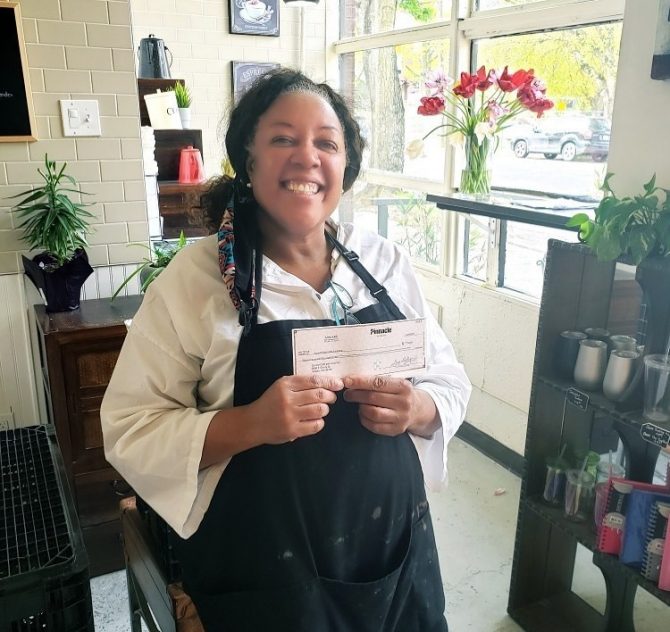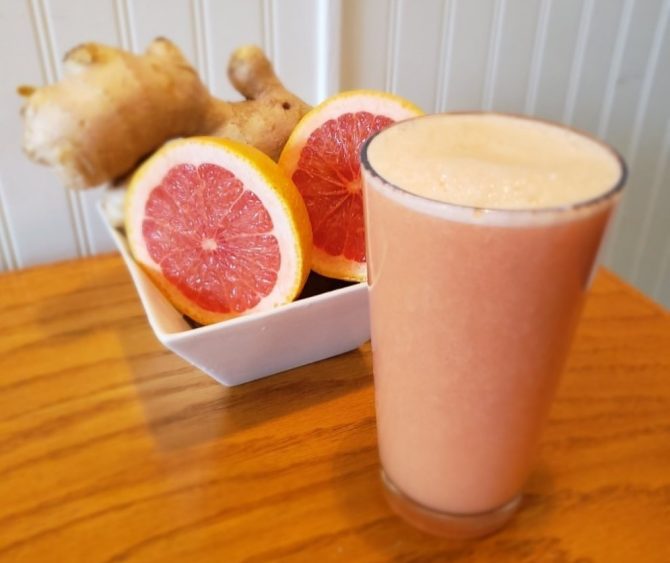In this series of interviews, we explore stories from immigrant/BIPOC*/women business owners who have adapted during the pandemic. The purpose is to learn and connect through shared experience. In this interview, Melissa Mather (Lead Teen Services Librarian at the Children and Family Justice Center) spoke with Bridgette, a caterer, café and juice bar owner.
*BIPOC means "Black, Indigenous, and People of Color."
 Meet Bridgette, Caterer, Café and Juice Bar Owner
Meet Bridgette, Caterer, Café and Juice Bar Owner
Bridgette opened her café, juice bar and catering company on January 18, 2020. It was an exciting time. “My family has been in the Central Area for generations and I’ve always had an entrepreneurial spirit.” She had a clothing business in Madison Valley for seven years, then transitioned to food service for the last 10.
Bridgette is a people person. “I love cooking for people and having conversations with people over food, so I decided I wanted to own my own business again.” Plus, she loves the community that is created by having a café and especially enjoys knowing the people who come in.
“With the Central Area losing historic buildings to new apartments and condominiums, there are limited spaces of less than 1,000 square feet. The new spaces are too expensive for a small, family-owned business to be able to rent and survive.”
Because of the importance of her community, and because she was tired of commuting, Bridgette wanted her business to be located in the Central Area. She began to look around for a location. “I was driving home from work late one night and saw a former BBQ restaurant that had a ‘For Lease’ sign.” She began to leave messages but didn’t hear back, so she continued looking.
Fortunately, a year and a half after she began making the calls to the location on Cherry Street, she secured the space. “It was important that the space feel different than when it had been a BBQ. I wanted people to come in and feel the transformation.” She envisioned the café as a place where the nearby high school students could come in for a quick lunch and friends could meet for coffee. For the short time that the café operated, it was that place.
Then COVID-19 hit.
“When Governor Inslee said that businesses needed to close, I had to close, but had already made food for the days to come.” Bridgette went onto social media and sold the food she had as “buy one, get one free.” She quickly sold out. Then she closed for two days, went home and researched how she had to change to remain an essential business.
Her strategy was to be flexible. “With COVID, a lot of businesses closed down because they thought they would get money from the government. Instead of looking into how they could remain open and be an essential business, they applied to the government program.” She didn’t want to jump on that bandwagon, so she modified her plans and kept going.
 A turning point.
A turning point.
Bridgette reopened and realized that although “Washingtonians were so good at being on lockdown,” she thought about being a “one-stop” shop. “I began to collaborate with other businesses to sell other items, such as flowers, mugs, dog toys and cards... basically becoming a mercantile store.”
Even with a long relationship with a bank, a spouse who owns his own business with savings equal to the amount of a loan for which they applied, Bridgette was unable to get a loan. She went to Business Impact NW, who offered her a loan.
She started a plan meant for later in her business, offering up to fifty box lunches - a variety of vegan, vegetarian and meat sandwiches - once a week to hospitals, businesses, etc. Provided with 48 hours' notice, she delivered and charged based on their location.
The road ahead.
Giving back to the community is part of the plan. “A new program I hope to launch this week will alleviate some of the stress on caretakers.” People with children who are home participating in school online can order box lunches based on a weekly menu. Bridgette’s plan also includes elevating other businesses.
“It’s very important to collaborate with the neighboring businesses for support. Having had a business in a predominantly white-owned business area, I see the difference in being in a minority-owned area.” In her former location, there were items like hanging flower baskets and green and white signs that welcomed people to the neighborhood. “This is not the case with the Central Area.” She is working with local businesses and the city to make the area look like other places with thriving businesses.
Bridgette is thinking about the holidays, the weather changing and how she can continue to operate when it is colder and wetter. Her interior space won’t accommodate physical distancing. “Fortunately, my property has front and side patios permitted for outdoor seating.” She hopes to show outdoor movies to introduce customers to the space. “The café will have outdoor heaters, tents for people to eat and stand under as they wait. The front window will be replaced with a coffee window.”
It comforts her to know that - one day - the café will come back to be that thriving space it once was.
Bridgette’s Business Tip: The GSBA Ready for Business Recovery Fund offers a $2,500 cash grant that doesn’t need to be repaid, plus technical assistance.
Support your local small business community! For more financial and small business resources, visit Invest in Yourself.
The Welcoming Center for immigrants, refugees and new arrivals connects you to the people and resources in the area you live.

